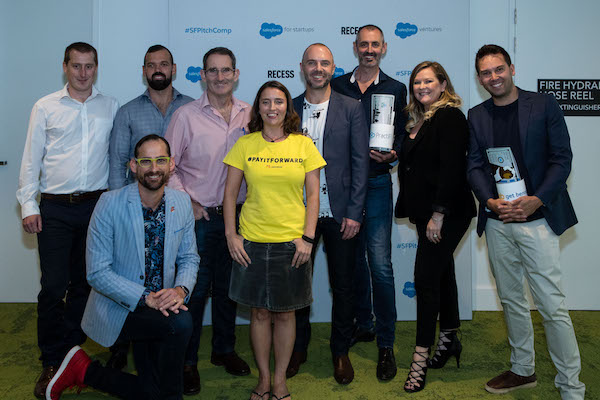
Get your FREE 30-day trial.
Start by selecting a product:
PitchComp saw three stellar startups pitch for the support of Salesforce Ventures. Here’s what founders can learn from those pitches.
It’s thrilling to see the sort of talent that Australia is producing in terms of entrepreneurship and startups. Nowhere has that been more obvious than at the PitchComp event at Salesforce World Tour Sydney, where we saw pitches by Zipline, Get Bennie and PractiFi.
There’s a great quote by Kevin Spacey about how important it is, when you get to the top, to send the elevator back down. Salesforce is an extremely successful business that was once a startup. As we send the elevator back down, we’re amazed by what we’re seeing.
We’re witnessing a real coming of age of the Australian startup ecosystem, and we saw that at PitchComp – it has gone through a dramatic renaissance in the past five years.
In my view the core pieces of the ecosystem are ‘talent’ and ‘treasure’. The talent is the smart people who are building businesses, and the treasure is the investors. In both of those areas we've come a long way.
Over the past three years the amount of capital that has been raised in Australia has doubled every year. This year we’re on pace to raise $1 billion of venture capital, which is staggering given that two years ago we reached just $200,000.
In nature, a land-based ecosystem hinges on two things – soil and weather.
The fertility of the startup ‘soil’ is something the Turnbull Government has been deliberately working on, with its focus on innovation.
The ‘weather’ is the cultural aspects of entrepreneurship and startups. We're now seeing a culture that increasingly celebrates outcomes rather than cutting down the tall poppy – a phenomenon that is said to have held the Australian startup scene back. And we’ve seen some very compelling outcomes that are inspiring the next generation. Seek, Carsales and, more than any other, Atlassian have captured the imagination of founders.
Those founders need to build the necessary skills to do what we saw at PitchComp, to tell a story and sell their vision. They need to engage potential investors because if they can’t do that, chances are they can’t get the money necessary to supercharge their business.
PractiFi was our overall winner and scored a spot in our upcoming Trailblazer brand campaign as a result. They also won the lion’s share of funding from Salesforce Ventures, with second-place Get Bennie also receiving funding.
PractiFi showed strong empathy for the person they were ultimately helping – their customer’s customer, and they asked their audience and the judges to identify with her as well. They gave her a clear persona – Claire, an investor – and they were able to lucidly describe the issue or problem that they were going to solve, so that financial companies could better serve her.
Of course, all three startups were very strong – they had made it through to the final in an impressive field of entrants. But if I picked one thing they could all improve, it would be their understanding of and readiness to talk about the numbers. There were a couple of questions from the judging panel about cost of customer acquisition and anticipated revenue. Revealing those numbers during a pitch really empowers your story.

Pitches are tough (but slightly easier with some expert advice on getting yours pitch-perfect), and success is all about telling a compelling story.
I think storytelling is a lost art, but it is fast becoming a new superpower. The best salespeople, entrepreneurs and CEOs are the ones who can capture the imagination of employees, companies and investors by articulating a clear, compelling vision. They do that through storytelling.
They become good at storytelling through practice. You don't just wake up one day and tell great stories. Instead, you practice in the shower, to your friends, in the elevator. You have to practice so that when the moment for a pitch presents itself – which, frankly, is every moment – telling your story is second nature, and it is authentic. If it’s not authentic, if it sounds fabricated, people don't buy in. They don't want to come along for the ride.
Robert Wickham is Regional VP, Innovation and Digital Transformation at Salesforce. He tweets at @rrwickham. His previous post for the Salesforce ANZ blog discussed the importance of teaching a team to love risk, and how to do it.
Watch all the action of PitchComp from the World Tour Sydney stage on Salesforce LIVE now. And if you missed World Tour, don’t despair too much – we’ve shared our presentations on Quip.